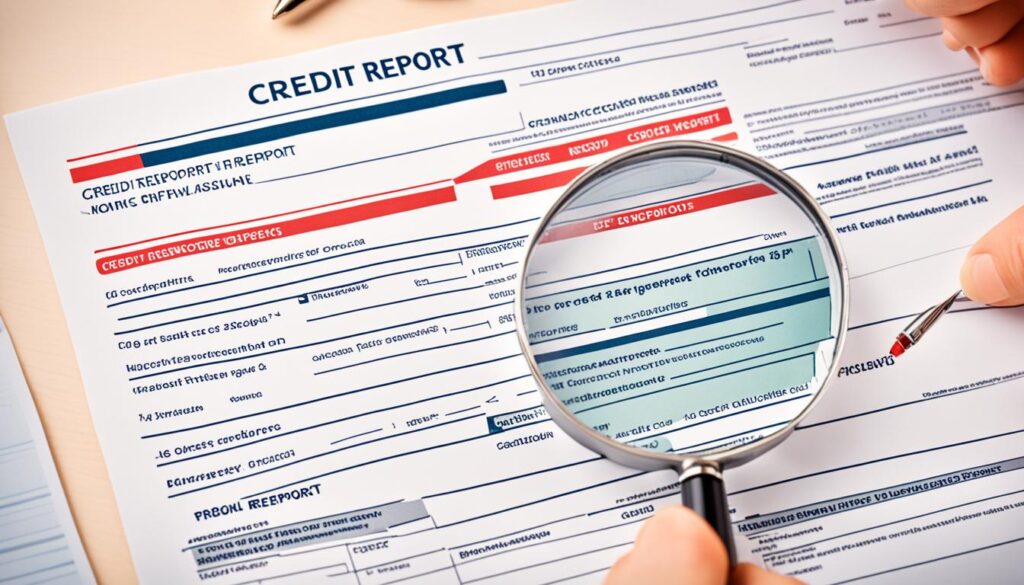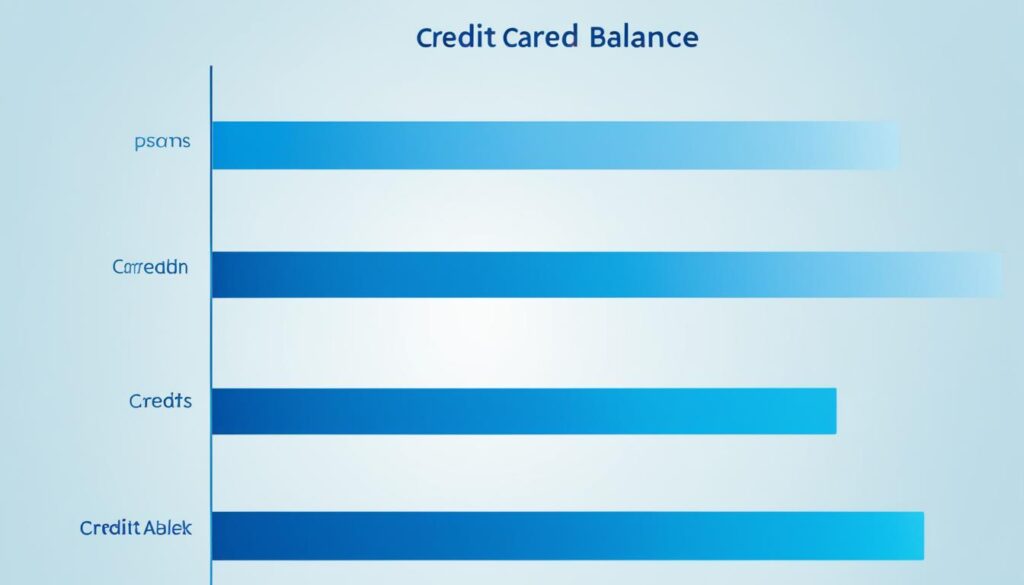Credit scores matter a lot in the U.S. A good score can get you great deals. This includes lower costs on homes, loans, and insurance. It can even help with job searches. But a low score can raise your costs and cause problems.
To make your credit better, take some steps. First, fix any mistakes on your reports. Also, pay your bills on time. And use tools that help build credit. Stick with it to get a strong credit history. This improves your financial well-being.
Want to raise your FICO score? These tips are here for you. They’re proven to work for any financial goal. Follow them to see big changes.
Understanding Your Credit Score
Your credit score shows how trustworthy you are with money. It’s key to know how it’s made. The FICO score and VantageScore are popular methods. Each uses different rules. By 2023, the U.S. average FICO® Score hit 715. This means most Americans have good credit.
Important parts that shape your credit score include:
- Payment History – This is 35% of your FICO score. Paying bills on time matters a lot.
- Amounts Owed – Making up 30%, it looks at your total debt. This affects how much of your credit you use.
- Length of Credit History – This is 15% of your score. Having credit for a longer time helps.
- Credit Mix – It’s 10% and means it’s good to have different kinds of loans.
- New Credit Inquiries – Also 10%, applying for too many new loans can hurt your score.
Most people have scores between 600 and 750. A score above 700 is good. But 800 or more is excellent. To get better scores, follow good money advice daily.
Boosting your credit score means handling key factors well. Always check your credit report. Know your credit history. Understand what FICO and VantageScore consider. This helps you make smart choices to improve your score.
Dispute Errors on Your Credit Report
Errors on your credit report can hurt your credit score. It’s important to fix them quickly. The Federal Trade Commission (FTC) says about one in four people find mistakes on their credit reports. It’s key to check your credit report often.
A good way to watch your credit report is to get free copies from Experian, Equifax, and TransUnion. You can do this through AnnualCreditReport.com. This free service lets you check your report every year. It makes finding and disputing errors simpler.

To start fixing your credit, carefully look over your credit reports. Check your personal info, account statuses, and balances for mistakes. If you spot any errors, it’s important to dispute errors right away with the credit bureau.
Here are the steps to dispute errors effectively:
- Gather Documentation: Collect any proof that supports your claim.
- Contact the Bureau: File a dispute with the right credit bureau (Experian, Equifax, or TransUnion).
- Follow Up: Keep an eye on your dispute to make sure mistakes are fixed.
Fixing mistakes on time is key for a correct credit profile. By keeping your credit report right, you protect your financial future and credit health.
Make All Payments On Time
Paying on time is key to a good credit score. Payment history makes up 35% of your FICO® Score. Late payments can lower your score and stay on your report for seven years.
Setting up auto-pay helps avoid late payments. It stops late fees and penalties. On-time payments each month boost your score.
Fix any mistakes in your payment history to keep your score up. Using tech for automatic payments means never missing a due date. This avoids credit report marks.
Having a bill-paying routine helps your financial health. It reduces stress and grows your credit score. On-time payments save you from late fees and high interest. You also get better financial chances.
Pay Down Credit Card Balances
Managing credit card debt is key to a good credit score. Your score is affected by your credit utilization ratio. This is your credit card balances versus your credit limits. It’s good to keep this ratio under 30% to help improve credit.
Experts say to keep paying off credit card balances. This lowers your credit utilization ratio. It also makes your credit report look better. Banks often report your balance to credit bureaus based on your statement’s closing date. So, paying off balances before this date helps a lot.

- First, pay off credit card debt with high interest. This saves money later.
- Try making more than one payment a month. This keeps your balance low.
- Watch your spending. Try not to charge new things until you’ve paid down what you owe.
- Set up reminders or automatic payments. This helps you pay on time and avoid late fees.
By paying down balances, people can improve credit scores. This opens up better financial chances.
Credit Score Improvement
Improving your credit score needs smart steps and steady money habits. First, lower your credit card balances. This makes a big credit utilization ratio difference. It’s important for your FICO score.
Another key move is to dodge unnecessary credit checks. Each hard check can lower your score a bit. So, try not to apply for new credit often. Also, always check your credit report for mistakes and fix them fast.
Consider these essential credit tips:
- Borrow less and work on paying back what you owe.
- Always pay on time to show you’re responsible with money.
- Keep a good balance of different credit kinds without spending too much.
Following this advice can slowly but surely help build your credit. It also makes your financial health better. Knowing what affects your FICO score helps you improve credit. Then, you can get a higher score over time.
Increase Your Credit Card Limit
Asking for a higher credit card limit is a smart way to boost your score. It lowers your credit use ratio, which is good for your score. Try asking your credit card company for this favor.
Be aware, though, a hard credit check might lower your score briefly. Yet, a soft check won’t hurt it at all.
- Pay on time, every time.
- Use your credit wisely.
- Show you have a steady job for better approval odds.
By following these hints, you’ll slowly but surely improve your credit. This makes handling money easier in the long run.
Utilize Credit Building Tools
Using credit building tools helps improve your FICO score. There are many ways to build and better your credit history. For example, credit builder loans are made to help build credit by reporting on-time payments.
Secured credit cards are another great choice. You must make a cash deposit that acts as your safety net. These cards are great for people starting or rebuilding their credit. Using these cards wisely can show good credit habits and boost your score.
Experian Boost is helpful too. It lets users add payment histories like utilities to their Experian report. This can quickly up their FICO score.
Then there’s the Extra Debit Card, mixing debit card ease with credit-building perks. Using this regularly and making payments on time helps increase your score over time.
Using various credit building tools is key for a strong credit history. It leads to a healthy financial future and opens up more credit options.
Report Rent and Utility Payments
Many people don’t know that rent and utility payments can help their credit history. By signing up for services that report rent payments, you can make your credit better. This is a smart move for anyone.
Not all FICO scores include rent payments yet. But the latest versions, FICO 9 and FICO 10, do. The big three credit bureaus add rent payment info if they get it. So, it’s key to make sure these payments are reported.
Fannie Mae’s Positive Rent Payment project started in September 2022. It helps renters in Black and Latino communities build good credit history. Renters can also use free services like Piñata and Self to report rent.
There are many services that let you report rent payments. These include Azibo, Bilt Rewards, and more. Some services are free for renters, but not all. Others might charge landlords. Yet, services like Boom and Rent Reporters charge renters.
Adding rent to your credit report is great if you’re new to credit. It helps build your credit history. Also, showing you pay rent on time helps with future rentals. This makes you look good to landlords.
Adopt Good Credit Habits
It’s important to have good credit habits for better scores and financial health. Checking your credit reports for mistakes is key. Small errors can hurt your score. Use credit monitoring services to stay on top of changes. They help catch problems early.
Setting up autopay for your bills helps avoid late fees. This ensures timely payments. Managing debt well is also crucial. Strategies like the snowball or avalanche methods are useful. They help you pay off debt in an organized way.
Using different types of credit can boost your score. This includes installment loans and revolving credit. Keeping a budget helps you not spend too much. This way, you can keep your debt low.
Good credit habits offer many long-term perks. As you use credit wisely, you’ll have more financial chances. This makes getting loans and good interest rates easier. A proactive approach helps improve both your score and financial health. Make these habits part of your routine for a strong credit profile.
